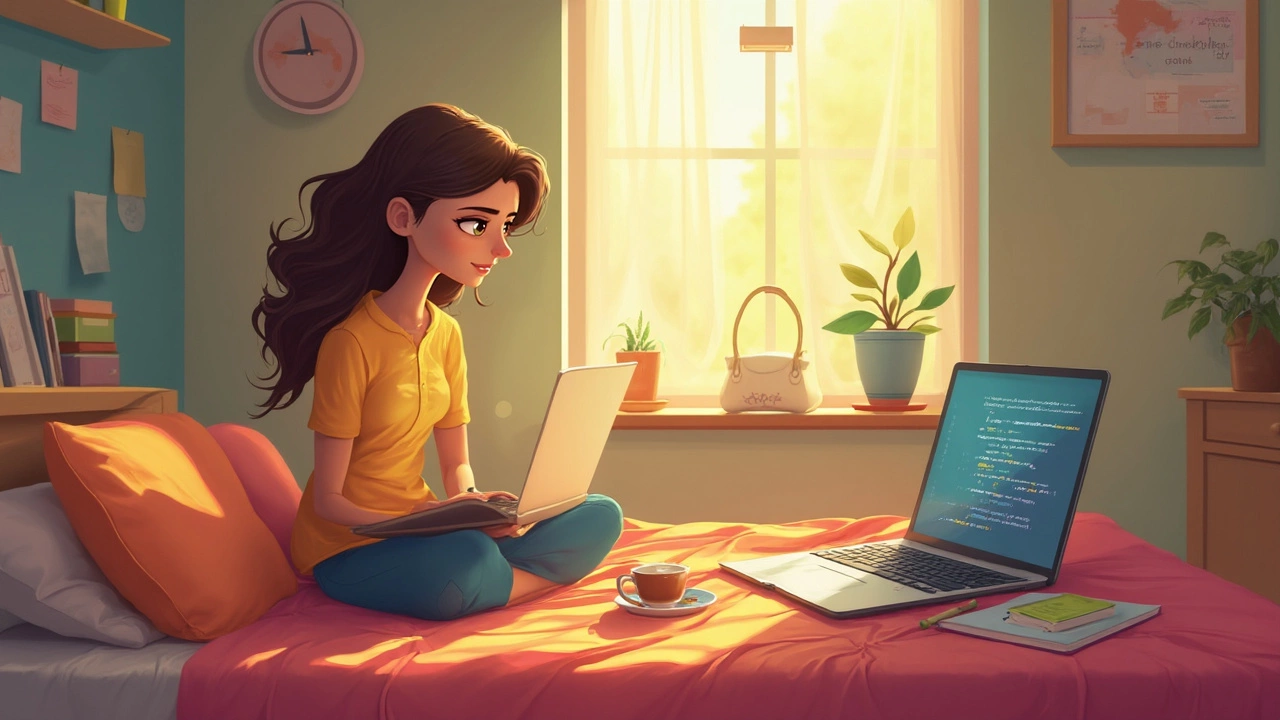Anybody who tells you that learning web development is “impossible without a teacher” has never actually tried it. Thousands of people are landing developer jobs after teaching themselves at home. No expensive bootcamp, no computer science degree—just curiosity and a stubborn streak.
The web is crawling with free (and shockingly good) resources. You can learn HTML, CSS, and JavaScript with hands-on tutorials, watch YouTube coders build real apps step-by-step, or jump on projects in online communities. Stack Overflow alone has saved more beginners' butts than every textbook combined. If you get stuck, someone’s probably asked your exact question already, and a helpful answer is usually one Google search away.
But I’ll be real with you: it gets overwhelming fast. The hardest part isn’t the code—it’s knowing what to learn next and not quitting when stuff breaks (and it will break). Tiny wins matter. Build small projects sooner, not later, even if they seem silly. My kid once made an ancient-game-looking website with just a picture of his favorite frog and a button that changed its color. That first win felt epic to him. You’ll get those moments too, and they add up quick.
- Why Self-Taught Web Development Works in 2025
- Best Free and Paid Resources That Actually Help
- Common Roadblocks (And How to Smash Through Them)
- Building Projects: The Secret Sauce for Success
Why Self-Taught Web Development Works in 2025
The old days of learning web development in a university classroom are long gone. Now, almost every skill you need is out there—plain and free—for anyone with wifi and a little patience. In 2025, you’ve got a buffet of free and paid courses, coding challenges, and project-based lessons. Heck, even Google runs its own learning series. Anyone can hop on and start building the basics today.
One big reason being a self-taught dev works so well is the sheer volume of online tools. CodePen, Replit, and GitHub let you build, test, and share your code instantly with others. You don’t need a fancy computer—many of these work straight from your browser. Plus, platforms like freeCodeCamp, The Odin Project, and Coursera walk you through real projects so you see immediate progress, not just theory.
Employers in tech care a lot more about what you can do than where you learned to do it. In fact, a 2024 Stack Overflow survey found that more than 70% of developers described themselves as at least partially self-taught. When you show up with a portfolio, nobody asks who your college professor was. They just want to see if your code works.
| Learning Format | Average Cost (USD, 2025) | Project-Based? |
|---|---|---|
| Online Course (Udemy/Coursera) | $15-50 per course | Often |
| Bootcamp (remote) | $4,000-$12,000 | Always |
| Self-Learning (free platforms) | $0 | Usually |
The most successful self-taught developers take learning into their own hands. They set goals, pick out mini-projects, and join online communities to find support. You don’t have to wait for permission to get started anymore. If you’ve got a question, you can usually find an answer or someone happy to help out.
Best Free and Paid Resources That Actually Help
You don’t have to dig deep into your wallet—or your time—to find killer tools for learning web development. There are two main camps: totally free stuff and the paid platforms that are actually worth it. Here’s what’s buzzing in 2025, with zero hype.
- freeCodeCamp.org. The king of free. You get hands-on coding exercises right in the browser, and you can actually earn certifications by finishing their projects. Their approach is direct: code, see results, repeat. No fluff, just skill-building.
- MDN Web Docs (by Mozilla). If you want the go-to reference for all things web, this is it. It cuts out guessing on what HTML, CSS, or JavaScript can do. Even pros use it daily.
- YouTube channels like Traversy Media, The Net Ninja, and Fireship. These folks make short, punchy videos that don’t waste your time. You can build a responsive website, step-by-step, for free. YouTube’s comment sections are surprisingly helpful, too.
If you’re cool dropping a few bucks, these paid resources can really sharpen your coding and web design chops:
- Udemy. Courses here are always on sale (never pay full price). There’s a course for everything, whether you want to master React or just set up your first landing page. Look for highly-rated instructors and check reviews—some are better than others.
- Frontend Mentor. It’s a hands-on challenge site. You pay a little, get real-world project briefs, and build sites to match. Best part: you can see how others solve the same problems, which speeds up your growth way faster than just reading docs.
- Scrimba. Scrimba mixes video lessons with interactive coding right in your browser, letting you pause and edit the code. The free material is great, but the Pro version adds full tracks and career-focused content. If you learn by doing, this style clicks for a lot of people.
| Resource | Type | Standout Feature |
|---|---|---|
| freeCodeCamp | Free | Step-by-step coding projects with real certifications |
| Udemy | Paid | Massive library, tons of real user reviews |
| MDN Web Docs | Free | Trusted reference for all major web tech |
| Frontend Mentor | Paid | Practice with professional-level briefs and peer feedback |
| YouTube | Free | Visual project demos and community support |
| Scrimba | Free/Paid | Interactive video-coding hybrid you can click and code |
Don’t get stuck picking the “one perfect course.” Mix and match, and remember: building small projects (even goofy ones!) beats endless tutorial-watching. The more you touch real code, the faster you’ll snag your first big win in web development.

Common Roadblocks (And How to Smash Through Them)
Learning web development on your own sounds awesome—until you hit your first wall. No matter how fired up you are, stuff gets tough along the way. But the most common problems all have workarounds. Here's what really stops people, and what you can do about it.
- Information overload: With so many tutorials, frameworks, and new buzzwords, it’s easy to feel lost. Beginners sometimes try to learn five languages at once and end up confused. If you stick to HTML, CSS, and JavaScript for your first few months, you’ll avoid 90% of the overwhelm.
- Imposter syndrome: You’ll probably think “I’m not a real developer” every other week. Even pros feel this way. Combat it by tracking your progress—one notebook, one app, whatever feels right. Celebrate every small thing that works, even if it’s just making a button blue.
- Getting stuck on bugs: Bugs happen. They’re way less scary if you break your problem into tiny pieces. Use tools like Chrome DevTools or VS Code’s debugger. And remember: no shame in copying error messages straight into Google. It’s what real devs do every day.
- Lack of feedback: Cranking out code in a vacuum sucks. Post your work in a forum or Discord group and ask for thoughts. Even one helpful comment can keep you moving. Lots of folks on Reddit’s r/learnprogramming started just like you.
- Motivation drops: People lose steam after the “honeymoon phase.” Short goals help—set challenges like “finish a one-page site this week” instead of huge open-ended plans.
Don’t freak out if you stall. According to a GitHub survey, 41% of self-taught developers said the hardest part was staying consistent, not learning code itself. Try the “20-minute rule”: tell yourself to work on something for 20 minutes daily, even if you’re just poking around in tutorials. Those short sessions stack up.
One trick that worked for me: I’d teach my son a tiny thing I’d learned each weekend. You really start to get something when you can explain it to a kid!
| Roadblock | Quick Fix |
|---|---|
| Overwhelm | Stick to basics; avoid distractions like frameworks at first |
| Bugs You Can’t Solve | Google errors; use community help like Stack Overflow |
| No Motivation | Set micro-goals; build stuff you actually care about |
| No Feedback | Share code online for advice—even beginners can help each other |
Building Projects: The Secret Sauce for Success
Learning web development on your own is a game of doing, not just reading or watching videos. You can binge tutorials for hours, but nothing actually sticks until you roll up your sleeves and build something—no matter how basic.
Start with things you already use or care about. A simple to-do list app, a landing page for a friend’s business, or a quiz about a movie you love. These “small” projects let you flex those coding muscles in a way tutorials just can’t. You’ll hit bugs. You’ll Google like crazy. All that sticks with you so much better than copying someone else’s code.
Check out this quick table showing real-life examples of beginner projects, how many lines of code they usually take, and the main skills you’ll pick up by building them:
| Project Idea | Skill Level | Main Tech/Tool | Typical Lines of Code |
|---|---|---|---|
| Personal Portfolio Website | Beginner | HTML & CSS | 80-200 |
| Interactive Quiz | Beginner-Intermediate | JavaScript | 100-300 |
| Simple Blog | Intermediate | HTML, CSS, JS | 200-500 |
| Weather Checker w/ API | Intermediate | JavaScript, APIs | 150-400 |
If you’re totally new, start small. Finish one thing, even if it’s plain and ugly. Then add to it week by week. Don’t be afraid to show your work off, either. Post it on GitHub, share it with friends, or get feedback from online groups. It’s wild how much faster you learn when you make your work public—even if it just pushes you to fix a typo.
Here’s a foolproof way to pick (and finish!) your next web development project:
- Start with a concrete, small idea. Don’t build the next Facebook. Build a calculator or a tip splitter.
- Break the project into bite-size tasks: “Make the layout,” “add a button,” “show the result.”
- Google things as you get stuck. Don’t try to memorize everything on the first go.
- Publish your project somewhere—even a free site like Netlify or Vercel does the trick.
- Ask for feedback, and actually make changes based on it. Real-world tweaks are where the magic happens.
Building projects doesn’t just teach you to code. It makes you problem-solve, debug, communicate, and build stuff real people use. When you finally land a job or a freelance gig, your portfolio—those projects—often matter way more than any certificate you’ll print off some online learning site.



